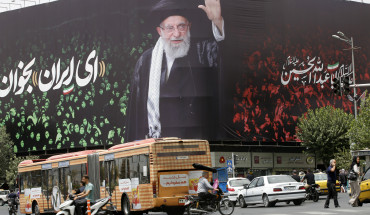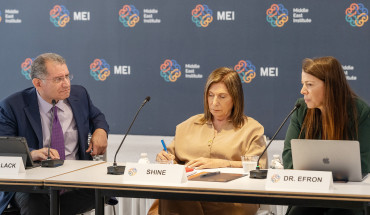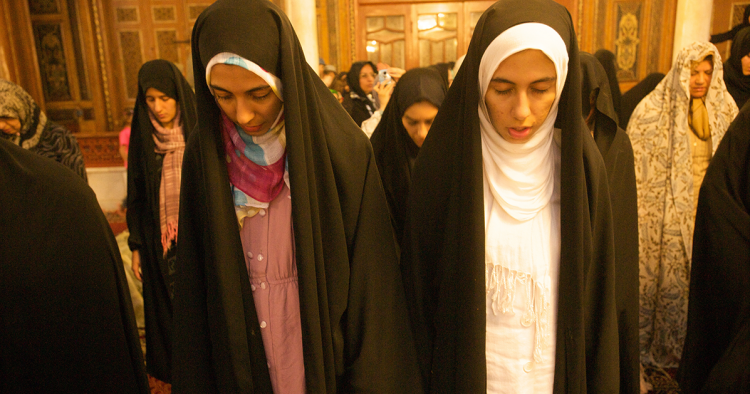A few weeks ago, Syrian social media was abuzz about a short clip featuring the famous woman religious scholar (da‘ayyah, plural da‘ayyāt) and regime loyalist Khuloud Suruji.[1] The video shows her praying and urging Syrians to turn to Allah as they face the current economic crisis brought on by the sanctions recently implemented as part of the Caesar Act. The short video shows Suruji’s extravagant villa and swimming pool in a tony area of Damascus called Ya‘afur. Syrians turned to social media to express their disgust that a da‘ayyah enjoying an extravagant lifestyle in her villa could lecture them about how to face economic hardships. While some viewers criticized the inequality between religious scholars and the rest of the Syrian population living in regime-held areas, one question has gone largely unaddressed: how have Assad and the Ba‘ath regime mobilized and manipulated female religious scholars throughout the Syrian civil war? The publicity given to Khuloud Suruji and other da‘ayyāt by a regime that endorses a secular socialist ideology has been part of a campaign to manipulate and mobilize female religious scholars since 2011.
Like other authoritarian regimes, the Ba‘ath regime has endeavoured to establish its legitimacy through more than just military force. To this end, the Ba‘athist state has substantiated its right to rule using various secular and religious ideological resources. The regime has drawn from competing sources of ideological legitimacy, oscillating between the co-optation of religious institutions and the imposition of secular Ba‘ath ideology. In the process, the Ba‘ath regime has compromised women’s rights and status in the public and private spheres.
Despite its nominal secularity, the Ba‘ath regime co-opted and allied with patriarchs of different social bases that are religiously conservative, such as tribal and sectarian ones, to ensure its legitimacy and survival.[2] This quest for support among diverse Syrian communities has come at the expense of women’s rights. An example is the regime’s reluctance to change or reform the Syrian Penal Code, which was enacted in 1949 with French and Islamic laws as its major sources. The main way that these laws restrict women’s freedoms is by placing constraints on their life decisions.[3] Although the Ba‘ath state is officially secular, it never implemented civil marriage. The lack of civil marriage curtails women’s right to choose their partners and keeps them locked into traditional roles defined by their position within ethnic or sectarian groups. By reinforcing traditional cultural and religious familial structures, the Ba‘ath state compromised women rights in order to satisfy traditionalist Sunni elements. Among other means, the Ba‘ath state has used these provisions concerning personal status law to police women’s political identity and legitimate the ethos of masculine protection. As such, the Syrian state has been mired in contradiction when it comes to women’s issues. It displays the empowerment of women as a centerpiece of its modernizing, socialist ideology, while preserving patriarchal structures within the law.
The state-religion relationship and the regime’s reluctance to advance women’s rights started in the 1980s, when the Ba‘ath regime tried to establish an alliance with groups representing a form of Sunni “Islamism,” which often promulgates conservative teachings about women’s role within society. The unequivocal support given to Hafez al-Assad by ‘ulamā’ (Islamic scholars, singular ‘ālim) such as Mohammad Ramadan al-Bouti, Ahmad Kuftaru and Ahmad Rajab also led the state to reinforce a traditional perception of women as subordinate. Establishing an alliance with forms of Islamism shored up the regime’s legitimacy as a minority sect that ruled a Sunni majority. At the same time, this co-optation of Sunni ‘ulamā’ served as a counterweight to the Muslim Brotherhood and its appeal to the Sunni majority. This approach continued under the rule of Bashar al-Assad, who supported a controversial Islamist women’s movement, called Qubaysīāt, while also cracking down on organizations that advocated for women’s rights in a manner that transcended sectarian divisions.
Following the 2011 uprising and the regime’s legitimacy crisis, Assad mobilized ‘ulamā’ and employed religious rhetoric.[4] Assad attacked protesters by emphasizing the religiosity of the state, which undercut claims that the protests, being led from the mosques, were an attack against an anti-religious state. In a speech addressed to ‘ulamā’ in 2014, he confirmed the religiosity of the state by emphasizing that the Ba‘ath state had always preserved the Islamic identity of the nation by applying shari‘a on personal status law.
The formation of the "Women’s Preaching Department” (al-da‘awah al-nisā’iyyah)
After the outbreak of the 2011 uprisings, the Ba‘ath regime gave religion greater benefits and more prominence in its official state narrative. This mobilisation of religious rhetoric also incorporated a seemingly “feminist” tone by Assad.[5] Struggling for political survival, Assad became very willing to expand the authority of religious institutions for his own political expediency.[6] He presents the state as an extension and defender of the “true” Islamic community: “Building this trust between the state and religious institutions is a basic thing to challenge those who want to promote conflict and destroy Islam.”[7] In accepting this expanded state patronage, however, religious institutions are required to show loyalty to the regime and distance themselves from other allies.
To ensure loyalty of women preachers, Assad launched al-Da‘awah al-nisā’iyyah (Women’s Preaching Department) in a January 2015 meeting that included a number of da‘ayyāt. He described the initiative as a long-awaited empowering of women in the religious sphere. In a seemingly “feminist” tone, Assad alludes to how da‘awah (preaching) has long been dominated by male ‘ulamā’ and critiques how the terms used to describe the two genders are discriminatory.[8] However, the true purpose of the meeting was not to empower the da‘ayyāt in religious institutions, such as the Ministry of Awqāf (religious charitable endowments), but rather to co-opt them. Assad’s own description of al-Da‘awah al-nisā’iyyah reveals how it is being used to strengthen the state : “This is not a religious institution in the abstract meaning …but a national institution. You were representing a [only] religious da‘awah but now [also] a national da‘awah…it is not logical to separate religion from the homeland (watan).”
This sort of rhetoric reassures these da‘ayyāt of state support. Previously the Ba‘ath regime maintained a confrontational attitude toward da‘ayyāt, forcing them to stay clandestine. However, starting in 2006, the state sought instead to regulate them, placing their lessons in state-monitored mosques.[9] Assad uses these da‘ayyāt as part of the state project to contain dissidents and fight extremism. As Assad stated, “People at the beginning thought…that the Islamic schools were the source of our problem, and that these Islamic schools caused extremism…However, we have transcended this debate [and]…now people know that our problem is not sectarianism…their [critics of sectarianism] problem is with the true religion (dīn)or the true believer.”[10] With his attack on the critics of sectarianism, Assad intended to condemn clerics who have remained neutral throughout the civil war.
Modernizing Islam by recruiting da‘ayyāt
In a 2017 speech, [11] Assad announced the formation of the Youth Religious Group, which is part of his project to “modernize” Sunni institutions and grant them a larger role in public life. In the speech, Assad used “patriots” and “‘ulamā’” interchangeably. Such rhetoric implies that all true ‘ulamā’ are patriots—and that dissidents cannot be legitimate religious leaders. Modernization, another key theme of the speech, is equated with breaking up the patriarchal monopoly of male ‘ulamā’ as the sole representatives of the religious sector. Assad also declared that a new arrangement of religious institutions is needed to confront the current crisis. To further emphasize the break with older institutions, Assad has introduced a variety of reforms to the Youth Religious Group, such as the inclusion of female ‘alimāt. In his attempt to recruit women as agents for his regime, he alludes to how women are more reliable “patriots,” who are less motivated by individualism and opportunism. Such remarks were made with the purpose of shaming male ‘ulamā’ who opposed the regime and to cast them as traitors to Islam and the nation.
The rhetoric of “modernization” surrounding the Young Religious Group seems tailored to manipulate women into becoming formal state agents who propagate the regime’s rhetoric. This self-interested, nominal support for women’s equality was further reflected in a presidential decree announcing the appointment of Dr. Salma ‘Ayyash as the first female deputy minister of awqāf in the Islamic and Arab world.[12] Bragging about her appointment, the deputy minister stood beside well-known ‘ulamā’ in advocating the state narrative of combating extremism and terrorism.
There has been much attention in the media and scholarly literature on how women in Syria have challenged authoritarian regimes, fought against extremist and jihadist groups, or even joined militaristic groups (e.g. the Kurdish forces) to achieve liberation, but there has been little focus on how the regime has manipulated women to it own ends, especially female religious scholars. The official incorporation of da‘ayyāt into religious institutions and a seemingly “feminist” tone by Assad illuminate how authoritarian rulers deploy strategic and ideological rhetoric to ensure their legitimacy.
Dr. Rahaf Aldoughli is a lecturer in Middle East and North African Studies at Lancaster University. She has written articles for the Middle East Journal, British Journal of Middle East Studies, and other academic publications.
Photo by Jean-Luc Manaud/Gamma-Rapho via Getty Images
Endnotes
[1]Syria TV, خلود السروجي على أطلال فيلتها تخطب بالناس.https://www.youtube.com/watch?v=CxbR0hXvZh4
[2]Elham Manea, The Arab State and Women's Rights: The Trap of Authoritarian Governance (Abingdon, Taylor &Francis Group, 2011)
[3]Rahaf Aldoughli, “Interrogating the Constructions of Masculinist Protection and Militarism in the Syrian Constitution of 1973,” Journal of Middle East Women Studies 15: 1, 2017: 68. https://doi.org/10.1215/15525864-7273706
[4]Rahaf Aldoughli,“‘Departing Secularism’: boundary appropriation and extension of the Syrian state in the religious domain since 2011,” British Journal of Middle Eastern Studies(2020).DOI: 10.1080/13530194.2020.1805299
[5]Bashar al-Assad speech to 'ulamā’ (August 25th, 2011), https://www.youtube.com/watch?v=RcJEf2N3BoM
[6]Bashar al-Assad speech before a group of ‘ulamā’, clergymen, imams, and women preachers (August 25th, 2014), https://www.youtube.com/watch?v=bwTDf-YRGMg
[7]Ibid.
[8]Assad highlights how women who work in da‘awah are called da‘ayyāt instead of ˈalimāt (plural of ‘alimah). He stressed that women in the religious sector who have been working hard, especially in "Eastern society" (al-mujtam‘a ash-sharqī) deserve to be called ‘alimāt just like men are called ‘ulamā’. ‘Ulamā’ is a term that denotes specialist knowledge of Islam and theology.
[9]It was not until 2006 that the state allowed qupaisyyāt (a women-led Islamic movement) to give their lessons in mosques after forty years of operating in severe secrecy. See Thomas Pierret, Religion and State in Syria: The Sunni Ulama from Coup to Revolution (Cambridge: Cambridge University Press, 2013), 199.
[10]النص الكامل لكلمة سيد الرئيس المضيئة بأبعادها الائمانية والغكرية والواطنية في لقائه مع الداعيات ١٢ كانون الثني ٢٠١٠، http://mow.gov.sy/النص-الكامل-لكلمة-السيد-الرئيس-المضيئ/
[11]Bashar al-Assad speech to the Youth Religious Group, https://youtu.be/6XCfWfOoMO8.
[12]سلمى عياش: المرأة الاولى في سورية بمنصب معاون وزيرhttp://syrialife.com/?page=show_det&select_page=3&id=4375
The Middle East Institute (MEI) is an independent, non-partisan, non-for-profit, educational organization. It does not engage in advocacy and its scholars’ opinions are their own. MEI welcomes financial donations, but retains sole editorial control over its work and its publications reflect only the authors’ views. For a listing of MEI donors, please click here.













